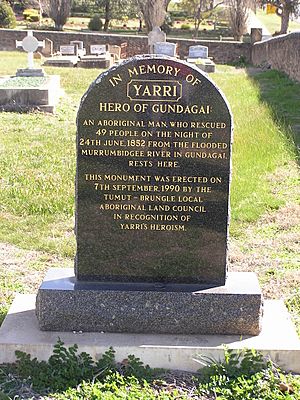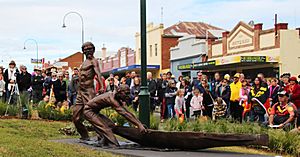Yarri (Wiradjuri) facts for kids
Yarri (born around 1810 – died 24 July 1880), also known as "Yarrie" or "Yarry", was a brave Aboriginal man from the Wiradjuri language group. He played a huge part in rescuing 69 people from the dangerous Murrumbidgee River flood in Gundagai, Australia. This amazing rescue happened over three days, from the night of June 25 to June 27, 1852.
Contents
Who Was Yarri?
Yarri came from a place called Brungle in the Gundagai area. His traditional name, Coonong Denamundinna, suggests he was connected to the Rainbow Serpent Dreaming. He worked as a shepherd at Nangus station. Many Aboriginal people lived in the area, with about 35 different groups in 1851.
Yarri was known for his kindness. He had even saved John Hargreaves during another flood in 1844. Because of this, he became good friends with the Hargreaves family and lived on their land at Tarrabandra until he passed away.
The Great Flood of 1852
The Murrumbidgee River's name comes from a Wiradjuri word meaning 'big water'. This river had flooded before, in 1844 and 1851. Older Aboriginal people had warned settlers about building too close to the river. They said the water could rise so high it would cover the tops of tall gum trees.
On June 25, 1852, a massive flood hit Gundagai. Forty-eight houses in North Gundagai were washed away. Many people lost their lives, with estimates ranging from 81 to almost 100. The town had a population of 397 people at the time. This flood became one of the biggest natural disasters in Australia's history.
The Rescue Mission
During this terrible flood, local Aboriginal men, Yarri and Jacky Jacky, became heroes. Together, they saved about 28 people. Jacky Jacky used a boat that could hold eight people. Yarri, however, used a small, traditional bark canoe that could only carry two people at a time. Other brave rescuers included Long Jimmy and Tommy Davis.
Honoring the Heroes
Even though poems and stories were written about the Aboriginal heroes right after the flood, it took a long time for them to receive official recognition. It wasn't until 1875, after Jacky Jacky had passed away, that an announcement was made. It said that the Aboriginal rescuers could ask settlers for sixpence as a reward.
Yarri, Jacky Jacky, and Tommy Davis were given special bronze breastplates to honor their bravery. They were also allowed to ask for sixpence from anyone in Gundagai. Sadly, Long Jimmy died not long after the rescues. He might have gotten sick from being out in the freezing cold and wet conditions.
A traditional wooden club called a nulla-nulla and a shield, believed to have belonged to Yarri, were given to the Gundagai Historical Society. These items were presented by Dallas, who was John Hargreaves' grandson.
Yarri became unwell later in life. He had a serious health problem but did not want to go to Sydney for treatment. He preferred to stay in Gundagai, the place he loved. He passed away on July 24, 1880, and was buried in the Catholic section of the North Gundagai General Cemetery.
Memorials and Tributes
Today, there are many tributes to Yarri in the Gundagai area. These include a town memorial, a sundial, a marble plaque, and a black marble headstone. A large painting in the Criterion Hotel in Gundagai shows the flood rescue scene.
Yarri Park, a recreation area in Gundagai, also remembers his heroic act. A sundial was put up in his honor by the family of Fred Horsley, one of the people Yarri saved.
In 2017, a community group in Gundagai, including members of the Wiradjuri community and families of those saved, put up a bronze sculpture. It's called "The Great Rescue of 1852" and stands in Sheridan Street, Gundagai. It honors Yarri and Jacky Jacky, the Wiradjuri heroes.
A composer named John Warner has even created a song and verse cycle called Yarri of Wiradjuri.
 | Frances Mary Albrier |
 | Whitney Young |
 | Muhammad Ali |



